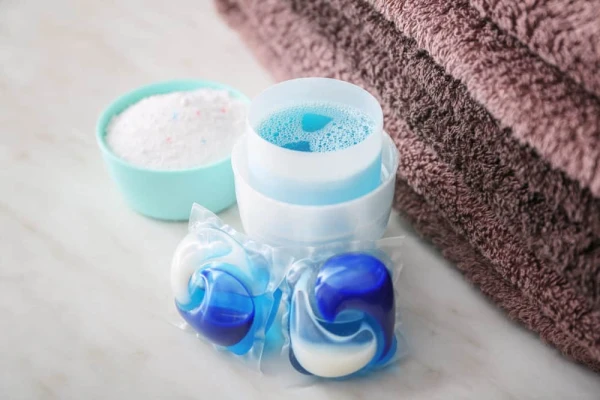
Synthetic materials have similar properties, but there are a couple of important differences.
What are Nylon and Polyester
Nylon is a synthetic fabric made from polyamides. The material is smooth, flowing, lightweight, durable, flexible, and water-repellent. The application of the fabric is not limited to clothing. Nylon is used to make parachutes, umbrellas, trekking tents, backpacks, and bags, for example.
Polyester is also a synthetic fabric, but made from polyesters. The material is dense, strong, and has a characteristic rough surface. 100% polyester is used among other things for making outerwear, accessories, and sports equipment. Often, other fibers such as wool and cotton are added to polyester to create fabric for trousers, suits, and other wardrobe items.
What are the Advantages and Disadvantages of Nylon
Advantages
-
Comfort. Nylon provides pleasant tactile sensations — it is smooth and soft. Moreover, the synthetic fabric is quite lightweight and will not add extra weight to a bulky jacket. The material retains heat well — this property is especially important for winter clothing.
-
Durability. Nylon has high strength but is also elastic. After stretching, the material quickly returns to its original shape, making it extremely difficult to tear the item. The fabric will not wear out or thin in problem areas of the jacket — under the arms, on the sleeves, and pockets.
-
Wrinkle resistance. Nylon does not retain creases, so the jacket will always look neat. Even after washing and drying, the item will not require thorough ironing.
-
Waterproofing. In both rain and snow, a nylon jacket will not get wet. Moisture literally rolls off the surface of the fabric, not penetrating inside the product.
-
Easy care. A nylon jacket can be washed by hand or in a machine at a temperature not exceeding 30 degrees, and spinning can also be used. However, of course, the characteristics of the garment's filling should also be taken into account.
Disadvantages
-
Susceptibility to ultraviolet light. Over time, nylon can fade and thin out. To prolong the life of the jacket, it should not be stored or dried in direct sunlight.
-
Low breathability. Nylon fabric does not “breathe” well, so the jacket can turn into a kind of greenhouse. During high activity or while indoors, you will likely sweat.
-
Accumulation of static electricity. Nylon will inevitably shock, transferring this property to other clothing or even hair. Thus, those with long hair may find it extremely uncomfortable to wear a nylon jacket.
-
High cost. Unlike polyester, the production of nylon is considered more resource-intensive, which, of course, is reflected in the final price of the fabric.
What are the Advantages and Disadvantages of Polyester
Advantages
-
Durability. Although polyester is not as elastic as nylon, the fabric can also boast strength. If we exclude the possibility of mechanical damage to the material, the jacket will last a long time.
-
UV resistance. Polyester is not afraid of direct sunlight, so even the brightest jacket will retain its color and not fade.
-
Comfort. Polyester is a fairly lightweight material. Yes, it is slightly heavier than nylon, but this difference cannot be considered critical.
-
Easy care. A polyester jacket can be safely washed at home, both by hand and in a machine at a temperature not exceeding 40 degrees. The item can be put in a dryer, considering the characteristics of the filling. Although polyester dries quite quickly at room temperature.
-
Low cost. Polyester is considered one of the most popular and affordable fabrics. Its production is cheaper than that of nylon, which affects the price of the material.
Disadvantages
-
Poor breathability. Polyester fibers do not allow air to pass through well and do not wick moisture away. You can easily sweat in a polyester jacket, which can cause certain discomfort.
-
Low water resistance. Water droplets do not roll off the surface of polyester but penetrate its structure. The jacket risks getting wet in bad weather if it is not treated with a special water-repellent coating.
-
Accumulation of static electricity. A polyester jacket can “shock.” To avoid discomfort, the item will need to be treated with an anti-static agent.
What is Better for a Jacket — Nylon or Polyester
If you are looking for a product that will last a long time, prefer nylon. It is more resistant to tearing and abrasion, so even with frequent wear, the item will look neat.
Both synthetic materials have low breathability, but polyester ventilates slightly better. For thin jackets and windbreakers intended for warm weather, choose this material.
If you plan to wear the item in conditions of high humidity and abundant precipitation, it is better to opt for nylon. A jacket made from this material will not get wet.
Thanks to its superior water-repellent properties, high strength, and durability, a nylon jacket is suitable for outdoor activities and sports.
For everyday winter jackets, either material can be chosen — they retain heat well. In such products, the filling is of greater importance.
If you are used to changing your looks every couple of seasons or more often, prefer jackets made of polyester. They are cheaper than nylon ones and are often found in the mass market.
Both materials will not cause trouble in care; however, polyester dries faster than nylon and is not afraid of drying in the sun. When washing jackets, it is much more important to consider other nuances such as the characteristics of the filling, the quality of the lining, the presence of fittings, and appliqués. Sometimes the manufacturer allows only dry cleaning of the item, which negates all the low-maintenance qualities of nylon and polyester.














Leave a comment